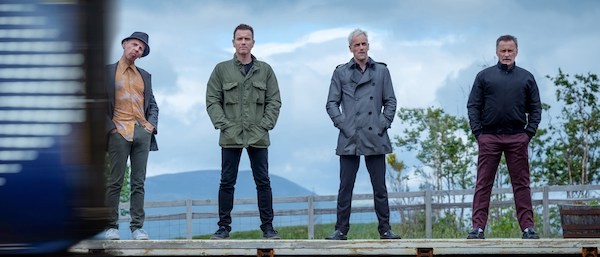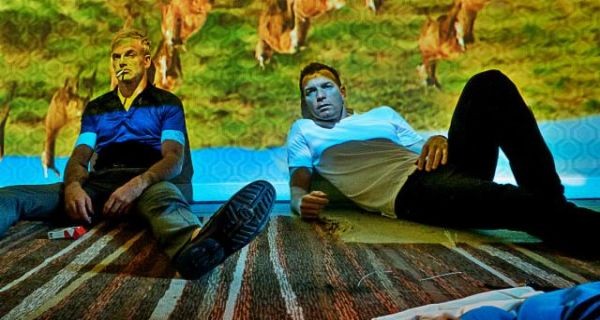The current “epidemic” of recreational opioid drug use just goes to show you that everything old is new again. The world runs in cycles. Once everyone forgets how awful/awesome something is, it comes back around. Fascists, I’m looking at you—particularly the fascists sprung on oxy.

Long before the American white working class lost hope and found pharma, the flower of Scotland’s youth did it. Dismal weather, lack of jobs, and a football-besotted culture of toxic masculinity put the Scots on the smack back in the gone-gone grunge era of the 1990s. Granted, it was the stepped-on brown stuff smuggled by haji through the Khyber Pass, not pure, white pills ganked from grandma’s Medicare-funded cancer meds, so score another for American exceptionalism, I guess. USA!
The last time the smack was flowing through our veins leading to centers in our heads, we were in the early states of an indie film revolution. In America, it was QT and RR. In England, it was Danny Boyle, a nerdy upstart who knocked one out of the park adapting literary bad boy Irvine Welsch’s cult novel Trainspotting. Perhaps inspired by his junkie characters’ fetishization of Brian Eno, David Bowie, and Iggy Pop, Boyle made the most of his modest budget by looking to 70s art cinema for visual inspiration. No dutch angle was too extreme, no composition too expressive. But it was his cutting that set him apart: fast for the pre-digital era, but not so fast as to lose visual coherence. In 1996, Trainspotting was madness, but there was clearly method.
The standout in the Trainspotting ensemble of dead ender Edinburgers was one Ewen McGregor, who subsequently hit the big time playing young Obi Wan Kenobi and singing opposite Nicole Kidman in Moulin Rouge. Boyle’s star continued to rise as well, culminating in eight Academy Awards for his 2008 film Slumdog Millionaire. But Trainspotting was lightning in a bottle, still studied for its hyper hip artistry, even as the players it elevated matured into mainstreamers. When Boyle got the band back together for a sequel, twenty years later, who knew if it could still work?

T2 Trainspotting is based on Welsch’s 2002 sequel Porno. The three mates from the projects, Mark (McGregor), Simon “Sick Boy” Wiliamson (Johnny Lee Miller), and Spud (Ewen Bremmer), have somehow lived into middle age, as has their frenemy Franco (Robert Carlyle). Simon and Spud are still in Edinbough. Simon is ostensibly running his family’s failing pub, while making his real living crafting blackmail schemes with his on and off Eastern European girlfriend Veronika (Anjela Nedyalkova). Spud’s back on the smack after a messy divorce and series of horrible misunderstandings brought on by the switch to Daylight Savings Time. Franco is, of course, in jail for robbery and assault, but he busts out just in time for the return of Mark from Amsterdam, where he fled with 16,000 pounds of the gang’s money at the end of the first film. Mark, too, had a bad divorce, and his well paying desk job is on the way out thanks to a corporate merger. So he decides to stay in Edinburgh for a while to put a business face on Simon’s idea for a high class brothel to be run by Madame Veronika. Needless to say, creative larceny, bad sex, and betrayal ensue.
There can’t be another Trainspotting, of course, but upon exiting the theater, my first words were “Where has THIS Danny Boyle been for the last decade?” His Aaron Sorkin-penned Steve Jobs biopic was formally inventive, as always, but T2 is the uncut Boyle funk—restless, visually witty, evocative, and cool. The Boyle I like is not the sentimentalist of Slumdog Millionaire, it’s the guy who says “Projection mapping looks like fun. Let’s try some of that!” The story is episodic and character driven, as was the original, but it lacks a certain sense of urgency and danger. Maybe that’s because the cast is clearly having so much fun, they can barely contain themselves. Nineties niihlism has worn thin for everybody—turns out dysphemism is less fun when there’s actual apocalypse in the air—which reduces the proceedings to a lighter, cops-and-robbers exercise.
Making Trainspotting into a psychedelic Ocean’s 11 is completely forgivable when the riffs are this sharp. The soundtrack is all aces, with Prodigy remixing “Lust For Life”, and punk classics like “(White Man) In Hammersmith Palais” rubbing shoulders with Fat White Family. The updated “Choose Life!” speech, which Mark delivers to Veronika in an upscale bar while trying to get in her pants, falls flat, but when Simon gets up in Mark’s face and accuses him of being “a tourist in your own youth”, the punch lands both on McGregor and the audience. Maybe Gen X has a little snarl left after all.
T2 Trainspotting